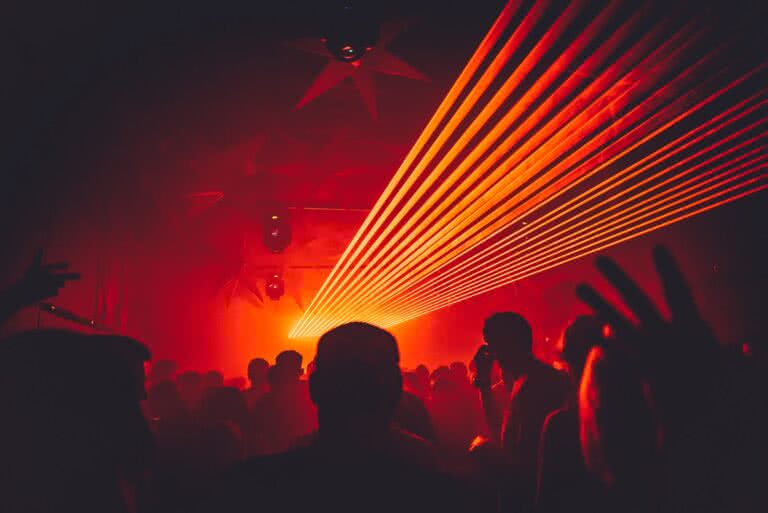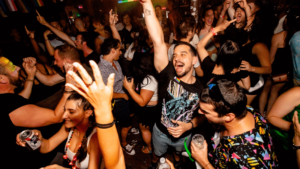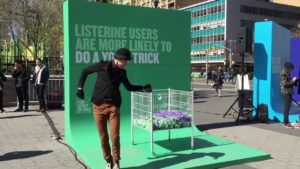Lakota, now running for almost three decades, is an institution in Bristol. The legendary venue on the corner of Upper York Street and Moon Street rose to prominence in the early nineties, establishing itself as the beating heart of Bristol’s vibrant underground music scene and one of the most famous clubs in the UK.
This Halloween weekend, Lakota Nightclub in Bristol is inviting ravers to surrender their phones and let their inhibitions run wild. For one night only, Lakota plans to recapture the no holding back attitude that ravers had when the club first started out.
But in a world where smartphones have almost become extensions of our bodies, banning devices is certainly a bold move by the iconic Bristol club.
We speak to Lakota’s Head of Marketing, Eoin Fenton, to learn more about the inspiration for Eats Everything’s Halloween Digital Switch Off.
Eoin explains that Lakota was the first venue to really focus on underground music and rave culture in the city – ‘a real old school rave scene.’ The idea for the digital switch-off came from a longing to revive the roots of the club.
“James Haggart, the director, has always wanted to do something where you really have people in the moment of the dance. We’re such a connected society nowadays and everything is online. This is about bringing back the feelings of an old-school rave.”

Photo: Giulia Spadafora | Soul Media
Eoin says the word ‘hedonism’ perfectly captures what they want to achieve by locking ravers’ phones away.
“We want to create a hedonistic night where people really can let go of reality and be in the moment. It sounds a bit clichéd, but I think it’s quite important that every now and again you turn your phone off and go out, have fun, and really live in what you’re doing.”
Lakota is teaming up with Yondr to transform the iconic club into a phone-free space. Yondr is a start-up that makes magnetic locking smartphone pouches, designed to help people switch off their phone and tune into life. Yondr CEO Graham Dugoni was inspired to create the pouches after noticing that people at many of the concerts he was attending were more absorbed in their phones than with the music.
This shared belief system gave life to the perfect partnership to drive Lakota’s phone-free vision forward. Attendees have to lock their phones away to gain entry to the club and can access them again upon leaving.
Eoin says the reaction to the concept has been great so far! This response backs up the findings in Eventbrite’s latest report on The Changing Rules Around Mobile Phones at Gigs. The proliferation of smartphone use (and the parallel rise of social media) is becoming more and more noticeable in live spaces – and most particularly at live music events. Eventbrite was curious to understand how attendees and performers felt about the omnipresence of phones at events.
70% of respondents said they find it irritating and 69% agreed that some action should be taken to minimise it.
DJ, producer, and record label owner Anja Schneider believes ‘there’s nothing more unsexy than phones’ in clubs.
“The reason people used to go to clubs was to flirt and dance. Now people are flirting all the time with their phones. And dancing with their phones in their hands. Does it stop people from letting go in the same way? Yeah, I think so.” – Anja Schneider
There’s no doubt that the rise of smartphones is driving a new kind of individualism in the club scene – one where people are often on their phones to ‘fake’ a good time, rather than truly connecting with the experience and the people around them. There’s also the fear of being recorded – a massive deterrent for club-goers letting go as they did before.
“There is always the thought that there could be someone filming and watching you. Whereas if you’re there with no phones on the dance floor you really can let go, which feeds into the hedonistic element of this show. There’s no paranoia or anxiety about potentially being filmed when you’re letting loose.”

It’s no surprise, then, that 56% of the event attendees reported feeling excited about taking part in Lakota’s digital switch-off.
Eoin and his team launched a pre-event survey to get a deeper understanding of the feelings and concerns of the registered ravers, and indeed, the future attendees are not without their concerns. 23% report feeling anxious about the event, raising issues such as getting lost, losing friends, and not being able to respond quickly in case of an emergency.
To quench these worries, the Lakota team have decided to set up a small area where attendees can check their phones.
“As much as we want to create a no-phones area – it is 2019. We can’t completely starve people of checking their phones. There will be a small area in the smoking area cordoned off where people will be able to unlock and access their phones, but when they come in they’ll have to re-lock their phones.”
Of course, Eoin explains that the smartphone revolution isn’t all bad, especially when it comes to marketing.
“You can get some really good footage from people who have been standing in the crowd and caught an amazing moment with the DJ – like a really good tune dropping or an emotional connection between the DJ and the crowd. So I think its a double-edged sword, really. On one side of it, it can be useful, especially for marketing. But at the same time, everybody’s on their phones.”
Our report revealed that the number of digital photos taken worldwide has grown from 660 billion in 2013 to a whopping 1.2 trillion in 2017.
There’s no doubt that the desire to capture images with our phones is a big part of their appeal at live events. So to ease attendees into the idea of a digital switch-off, Eoin and his team are allowing members to record their night the old-fashioned way.
“We’re handing out disposable film cameras to allow people to capture their night. We plan to upload the old film photos online – it gives a nice aesthetic to it and people can enjoy having a few photos with friends.”
To make the event a true success, the Lakota team have curated a dynamic lineup to turn up the energy and inspire event-goers to truly lose themselves in the music, including Lord Leopard, Alexis, performances by Little Gay Brother, and an electric five hour set by Bristol native and ex-Lakota regular Eats Everything?

Eoin explains East Everything? is the perfect headline act to achieve that ‘old-school, hardcore rave’ effect.
“Eats Everything? Has a strong connection with the history of Lakota. It works nicely for him to bring an old-school rave feeling because he grew up in Bristol, going out to raves at Lakota and playing hardcore sets here. He has a strong affinity with the club already.”
Eoin explains that the ultimate aim of the digital switch off is to showcase that it is doable – that people don’t need to be connected 24/7.
“Hopefully, it will show people that they can switch off and be in the moment and have just as much of a good time. It’s about breaking down the barriers that people have against it.”
Will asking ravers to abandon their phones succeed in breaking down barriers and rekindling the hedonistic charm of the old-school rave experience? We’ll be catching up with Eoin post-rave to hear all about it – stay tuned!
Want to surrender your phone and unleash your inhibitions? Grab your tickets for the Digital Switch Off on Eventbrite now! Or check out their Facebook, Instagram and Twitter pages for more details.
Inspired to set up a digital-free event of your own? Get started here!





